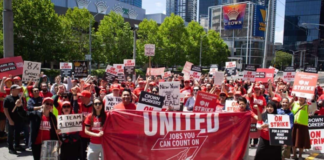Graphic footage of the wooden boat carrying up to 100 Iranian, Iraqi and Kurdish asylum seekers smashing onto the cliffs of Christmas Island on December 15 went around the world. Forty-two people survived, while at least 30 people lost their lives. Three children have been orphaned.
Not surprisingly the Coalition is repeating its “stop the boats” slogan. The government is blaming people smugglers and talking up its proposal for a regional processing centre to deter asylum seekers travelling to Australia by boat.
The government has rejected calls for a full independent inquiry into the disaster. But there are serious questions that need answers. How did the boat get so close to Christmas Island without the navy knowing about it? Why did it take an hour and half for two small navy inflatables to render assistance? Why weren’t they equipped with the nets that were recommended for rescues in an inquiry in 2002?
But the bigger questions regarding December 15 are about the punitive policies of the Australian government. The Gillard government has pursued the same failed policies of the Howard government that just as surely resulted in the sinking of the SIEV X in 2001 with the loss of 353 lives.
There needs to be fundamental change to Australia’s refugee policy—to end offshore processing, mandatory detention, and drop the proposal for a regional processing centre. But in regard to the Christmas Island tragedy itself, there are three aspects of Australia’s refugee policy that are specifically to blame.
Policy failures
Firstly, Australia has increasingly pressured the Indonesia government to systematically detain asylum seekers—and even mandated UNHCR refugees. The harassment and persecution in Indonesia itself pushes asylum seekers to leave Indonesia as soon as they can.
Secondly, there is no certainty and no future for asylum seekers or refugees in Indonesia. It is not a signatory to the Refugee Convention and does not resettle refugees. Australia funds the UNHCR to register and process asylum seekers in Indonesia, but until 2010, Australia would not resettle UNHCR refugees from Indonesia. Only 32 were resettled in 2008-09. In 2010, the government said it would resettle 500 refugees from Indonesia, but so far less than 100 have actually arrived.
It takes months for the UNHCR to register asylum seekers and then many more months for refugee claims to be processed. Even when they are found to be refugees, they can wait many years for the UNHCR to find a country willing to resettle them.
The lack of any guaranteed resettlement means the only option for asylum seekers and refugees is to take a boat from Indonesia to Australia.
The Howard government cut Australia’s refuge intake to 13,000. By doubling that quota—which would still be less than prior to the Howard government—Australia could easily take all the asylum seekers and refugees in Indonesia.
Thirdly, the Australian government’s efforts to criminalise people-smuggling (and by association asylum seekers themselves) means that boats have to operate outside the law and asylum seekers themselves can be reluctant to contact Australian or Indonesian authorities should they require assistance, for fear of being detained in Indonesia.
In October 2009, the then Labor Prime Minister Kevin Rudd called on the Indonesian government to intercept a boat of 253 Tamil asylum seekers. All the Tamils remain imprisoned in appalling conditions at Tanjung Pinang in Indonesia, although all but nine, who await a final decision, have been found to be refugees.
While the extreme weather may have been the immediate cause of the disaster at Christmas Island, just as surely, government policies drove that boat onto the cliffs.
But there is no sign the government has learned anything from the tragedy. The cheap politicking and the refugee bashing continues.
The government won’t even act humanely towards the survivors. It has ignored calls for the survivors to be brought to the mainland and allowed to live in the community while their claims are processed. They will suffer the misery of mandatory detention on top of the horror they have experienced. At least 15 of the victims have been identified but the government will not release the names of survivors or the dead, leaving relatives in a dreadful limbo of unknowing.
At present rates of processing, the survivors will still be in detention in a year’s time.
If we needed a powerful argument for building a movement in 2011 to free the refugees—the Christmas Island tragedy is it.
Ian Rintoul





